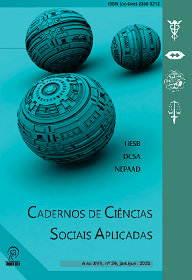Outsourcing in the public sector: the case of UESB
DOI:
https://doi.org/10.22481/ccsa.v17i29.6652Keywords:
Condições de trabalho, Precarização, Terceirização no setor públicoAbstract
The present article aims to identify precariousness focus in outsourced working conditions at UESB, through a comparative analysis between the outsourced workers and the public servants from it. It is a case study, exploratory, with quantitative approach. The research used the literature review to build the theoretical framework and secondary data collection, obtained through PROAD/UESB and SINDILIMP/BA. The investigation found the following results: 1) the outsourced workers from UESB has a working journey longer than the public servants. While the public servants journey is from 30 to 40 hours per week, the outsourced's 44 hours per week; 2) the outsourced workers from UESB receive less than public servants for the similar activity performance. In the year 2014 the outsourced earned less than half of the public servants, that is, the outsourced remuneration was 50,3% smaller than the public servants. In 2017 the difference was less than 43,3%; 3) the outsourced workers from UESB does not have the stability witch is guaranteed to the public servants. Then concludes that the precariousness of the working conditions is something present in the UESB outsourced work environment.












